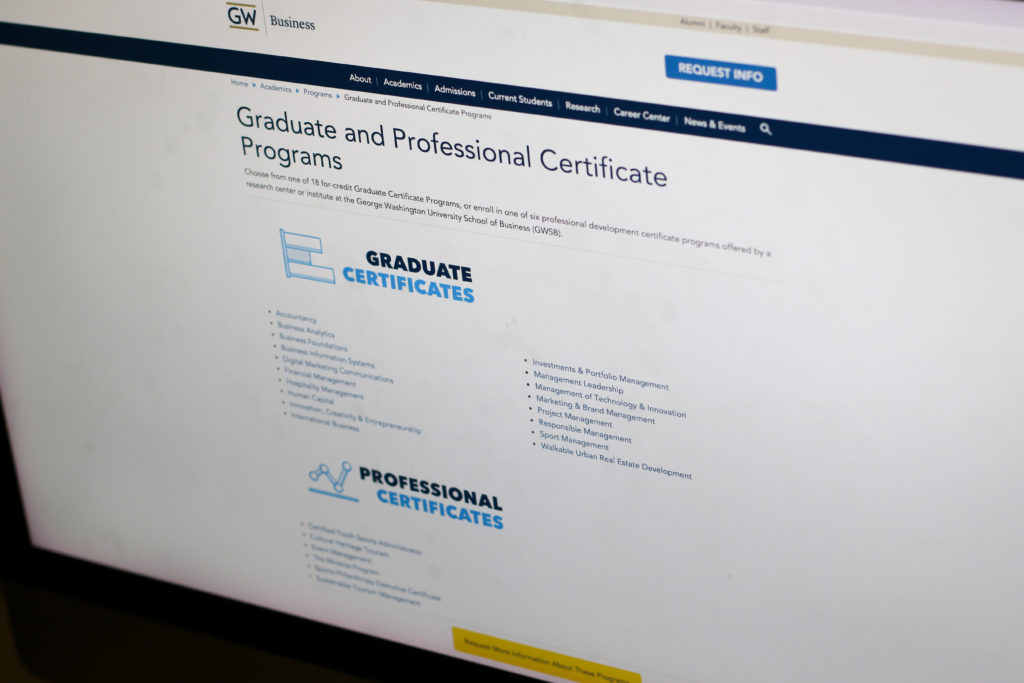The School of Business is hoping to make its programs more accessible by moving graduate certificates online.
Officials announced last week that they expect to offer at least a dozen of the existing 18 graduate certificate programs online by fall 2020, and administrators are also allowing graduate students to “stack” their certificates to earn a master’s degree. Officials and faculty said the new efforts will help promote and grow GW’s business programs to non-traditional students who may find the flexibility of the certificates more palatable than a traditional graduate experience.
Anuj Mehrotra, the dean of the business school, said in a message to students last week that the range of certificates offered is “richer than ever,” and officials plan to offer more online, evening and weekend classes to attract non-traditional students.
“In the interest of enhancing the flexibility of our program offerings, we are working to increase available evening, weekend and online courses to accommodate students’ professional and personal schedules,” he said.
University spokesman Jason Shevrin said officials have no new information on the certificates because they are in the early stages of planning and development. He said the online offerings contribute to the business school’s strategies to adapt to “the constantly evolving global business environment and the changing nature of the business education market.”
“The planned online certificate programs will give students flexibility in choosing a path of study tailored to their individual needs, combined with the convenience of distance learning,” Shevrin said in an email.
He declined to say which certificates are being put online and who will be helping to transfer the classes. He also declined to say what feedback officials have heard from students about making classes more accessible.
He declined to say why the transfer of certificates online will take a year and what challenges officials anticipate facing.
Lisa Delpy Neirotti, an associate professor of sports management, said the process of moving courses online is time-consuming because faculty must book time in a studio to film their classes. But ultimately, the online certificates respond to increasing demand from working students who cannot attend on-campus classes during the day, she said.
“More and more students are looking for more and more flexibility,” she said.
Officials also began piloting “online happy hours” this semester to make online students and alumni feel more connected to the business school.
Neirotti said faculty are working with a curriculum specialist to make videos and tweak their teaching styles to work digitally and ensure quality offerings. The School of Business features an instructional design office and hired an instructional designer to help develop online courses last fall.
The Faculty Senate passed a resolution last spring calling for additional oversight for online courses despite data from the provost’s office showing that the programs were performing well.
James Bailey, the Hochberg Professorial fellow of leadership development and a professor of management, said faculty have been preparing for the online courses through the school’s “What’s Under the Hood in GWSB Online Programs” speaker series, two of which he has led. The series breaks down the benefits of teaching and learning online for students and faculty, according to a message from the business school dean last month.
He said that although some faculty were reluctant at first, many have seen that the certificate program is the “way of the future” for the school because of high student demand.
“Just like anything new, it takes a while,” he said.
He added that making the certificate program more accessible could also help counteract the effects of the declining graduate enrollment in the business school. He said people may be so impressed by the business school after obtaining a certificate that they want to stay and complete a master’s degree either online or in person.
A drastic drop in graduate enrollment last fall left the business school with a multimillion-dollar revenue shortage.
“It kind of succeeds on two fronts,” he said.
Chris Leinberger, the chair of the Urban Real Estate Analysis Center, said allowing graduate students to create their own majors through multiple certificates allows students who are older or who have families to earn a degree without shaking up their day-to-day lives.
He said graduate education is expensive and time-consuming so students should be able to try out the business school through a certificate program before they decide if they want to commit to an entire master’s degree.
“It’s a matter of putting your toe in the water and seeing if it feels right,” he said.
Joe Ritchey, a 66-year-old student taking one of Leinberger’s classes to apply to a Walkable Urban Real Estate Development graduate certificate, said he started pursuing the certificate to assess GW’s business program and has been impressed with the depth of the course offerings. He said he hopes to finish his certificate next fall and potentially pursue certificates in finance and marketing, which could also help him professionally.
“I’m excited to have the opportunity to take these programs as kind of bite-size chunks so you can have the sense of accomplishment within a year or so,” he said.




